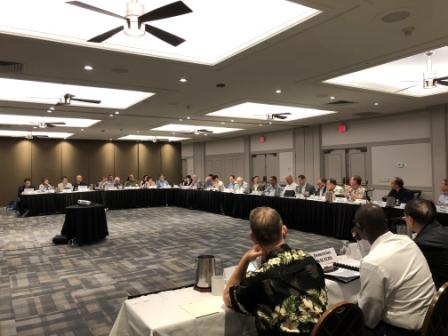On 11-13 April,2018, CACDA and U.S. Naval Postgraduate School co-organized the 10th China-U.S. Strategic Dialogue at Hawaii. The Chinese side was led by CACDA President Amb. Zhang Yan and Vice President General Qian Lihua, with experts from Academy of Military Sciences, Rocket Forces Command College, China Academy of Engineering Physics, National Defense University, China Institute of Contemporary International Relations, Tsinghua University, Shanghai Institute of International Studies. The U.S. team was headed by Admiral Cecil Haney, former Commander of U.S. Strategic Command, joined by scholars and officials from State Department, Department of National Defense, STRATCOM, the Brookings Institution, Naval Postgraduate School, Pacific Forum, the Heritage Foundation, Center for Strategic and Budgetary Assessments and MIT. The dialogue focused on the issues including recent developments in the global and regional strategic environment and U.S.-China relationship, evolving U.S. nuclear strategy and capabilities and the 2018 U.S. Nuclear Posture Review, challenges and opportunities in North Korea, evolving Chinese nuclear strategy and capabilities and implications of PLA reforms, and the impact of new technologies on the global strategic environment and the U.S.-China strategic relationship.
In his opening remarks, Amb.Zhang Yan stated that as an unofficial exchange platform, the dialogue was an important channel for experts and scholars from both sides to enhance understanding and promote trust on strategic security issues of mutual concern. All the topics of the meeting were very important, especially the 2018 U.S. Nuclear Posture Review, which was full of Cold War concept and zero sum thinking, pending a comprehensive and in-depth discussion. Meanwhile, the DPRK nuclear issue was facing a new window opportunity. China and the United States should maintain close communication, coordinate relevant parties, boost the denuclearization process and achieve the peace and stability of the Peninsula. He stressed that today's world was undergoing profound changes and adjustments, with full of challenges and uncertainties. It was hoped that the dialogue will increase the consensus of both sides, promote the strategic mutual trust, and help China and the United States jointly maintain regional and global peace, security and stability.
The dialogue was launched in 2005, aiming to enhance China-U.S. communication and mutual trust in strategic and security area through unofficial channel.


- Previous article/上一篇:CACDA Met with CTBTO Delegation
- Next article/下一篇:President Zhang Yan Met with ICRC President Peter Maurer


 京公网安备 11010102004558号
京公网安备 11010102004558号